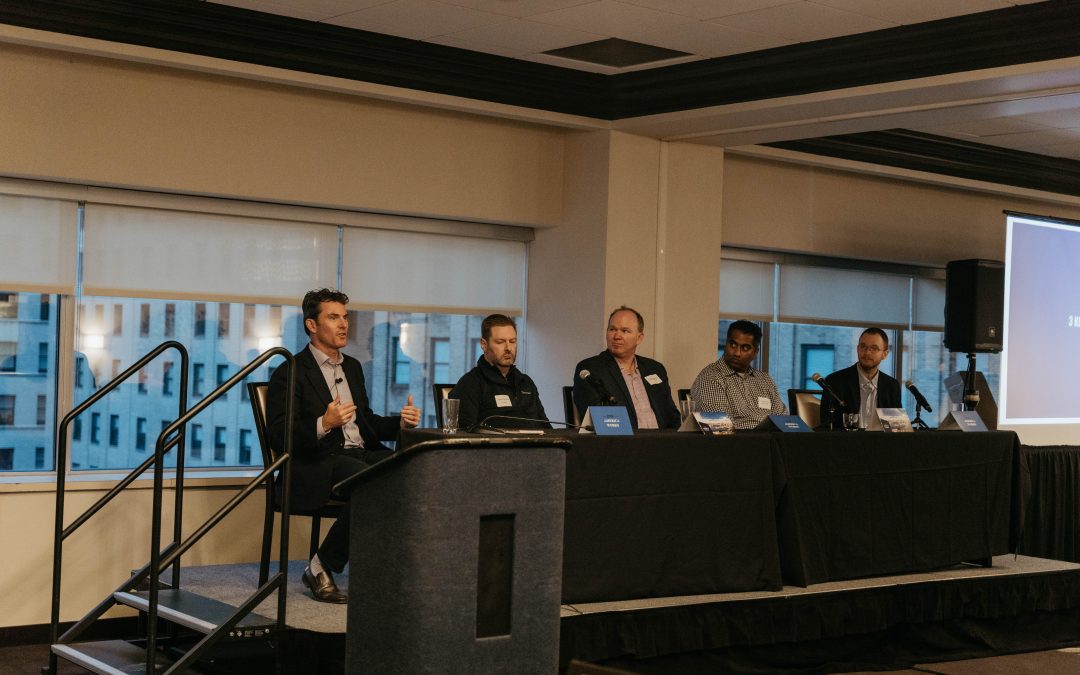All News

Resilient Cities: Experts Meet in Pittsburgh to Boost Access to Capital and Region’s Tech ‘Brand’
As layoffs roil Silicon Valley, tech industry experts met in Pittsburgh recently to discuss the needs of startups and other innovative firms in the middle of the country to ensure their continued growth. The Oct. 20 event, hosted by One America...

Tech Started in the Steel City
Pittsburgh has been a hotbed for innovation and progress for many years. From the steel industry to technology to medical research.

The Midwest: Where Founders and Investors Meet
One America Works recently convened a series of in-person events in Columbus, Ohio and Pittsburgh, Pennsylvania bringing together tech startups, venture capital investors, policymakers and other stakeholders in the innovation economy. This week, we’ll focus on our work in Columbus – anchored by the Connecting the Coasts to the Heartland conference – and share some other exciting news from Ohio’s innovation economy.

‘Back In the Game’: Hundreds of Tech Investors and Startups Hold Midwest Summit to Create More Innovation Jobs
Hundreds of venture capital investors and startup companies converged in Columbus, Ohio, to accelerate the pace of tech sector investment and job creation in America’s non-coastal cities, better known as the Silicon Heartland. Investors, founders...

Silicon Chip Manufacturing is Booming in Columbus, Ohio
Silicon onshoring is the process of moving silicon chip production to a new location. This can be done for a variety of reasons, including to take advantage of new tax incentives and to be closer to customers. In recent years, there has been a lot...

Show Me The Money!
Within a few months, the State of California and New York City, representing the largest tech and innovation hubs in the world, will require new job postings to include detailed salary information up front. The data they produce will demonstrate yet again how expensive it has become to recruit and retain top talent in big cities on the East and West coasts.

Drive Capital Raises Another $1B to Invest in Columbus and the Midwest
In recent years, the Midwest has been a hotbed for innovation, with companies such as Amazon, Google, and Uber all setting up shop in the region. And now, there’s another player in the game: Drive Capital.

Columbus: The Smartest City in America?
By harnessing the power of big data, Columbus, OH has established itself as a leading smart city in the world.

Building a Midwest tech hub
Last weekend, a New York Times headline posed the following question: “Can Tech Ecosystems Now Grow Inland?” (Spoiler: They can, and they have been for many years now.) The Times story was based on an interview with AOL founder Steve Case, who observed: “I believe we’ve hit peak Silicon Valley. It’s not that the area won’t continue to attract innovators, but it won’t have the lead it has held for the last decade.”

Recharging the Heartland
Clean energy technologies – or cleantech for short – are making a comeback in the United States. Decades ago, solar panels, electric vehicles and other cleantech products were pioneered in our country, but just as we started using more of those products to power our daily lives, we outsourced the manufacturing to other countries. It’s an all too familiar story across so many industries.

Chip Makers and Life Changers
For years, there’s been a lot of talk about securing a domestic supply chain for computer chips and other semiconductor technologies. But in the wake of the pandemic and the acute global chip shortage it triggered, that talk is turning into action. Chip manufacturers are announcing new plants and expansions worth hundreds of billions of dollars in states like Arizona, Texas and Ohio.

Diverse Places, Diverse People
The geography of the tech sector is diversifying and Heartland cities are making major contributions, as executives and recruiters realize that the highly skilled professionals they have been looking for already exist in America’s small and mid-sized cities.

‘Attracting and Inspiring’ Diverse Tech Talent: An Interview With CCAC President Quintin Bullock
Promoting diversity is both a challenge and an opportunity for the tech sector as it expands outside Silicon Valley and other traditional tech hubs. One America Works sought the expertise of Dr. Quintin Bullock, President of the Community...

To Commute or Not to Commute?
The Return to Office debate continues, with employers and workers pulling in different directions and no clear resolution in sight. That said, tech leaders should seriously consider diversifying their geographical footprint, by opening new offices that are closer to their people, so that traveling to the office isn’t the same ordeal it used to be before the pandemic.

Can I see you in my office?
It’s not too early to assess how “Return to Office” policies are going. While some companies offer flexibility around working remotely, a large number are requiring their employees to come into the office – at least part of the time. Now over halfway into 2022, it’s becoming apparent how it has been going…And safe to say, Not Well.

The Return to Office Revolt: It’s Bigger Than You Think
The standoff between professionals who worked remotely during the COVID-19 pandemic and employers who want them back in the office is growing more intense.

‘We Are a Tech City,’ Pittsburgh Mayor Ed Gainey Declares at OAW Event
Pittsburgh will always be proud to be the Steel City, but it’s also a rapidly rising center of technology investment and innovation.

Inclusion for Aspiring Tech Hubs
Diversity and inclusion in the workplace continue to be an ongoing challenge within the tech industry, specifically as it relates to the LGBTQ+ community. Authentic inclusion plays an important role in supporting fast-growing tech hubs looking to maintain or enhance their tech economies and attract or retain talent.

Talent and Innovation without Borders
Over the last few months, One America Works has kicked into gear with innovative events and activities directly supporting tech talent, tech companies, and growing tech hubs. As the decentralization of the tech sector and its workers continues, our team continues to find ways to help tech firms and professionals navigate a new world of work.

Need Fintech Workers? Better Look Beyond Wall Street and Silicon Valley, OAW Data Confirms
From payment apps to virtual banks to the blockchain and more, the U.S. financial technology sector now plays a critical role in the wider financial system that underpins our entire economy. To keep growing, fintech firms need talented...


